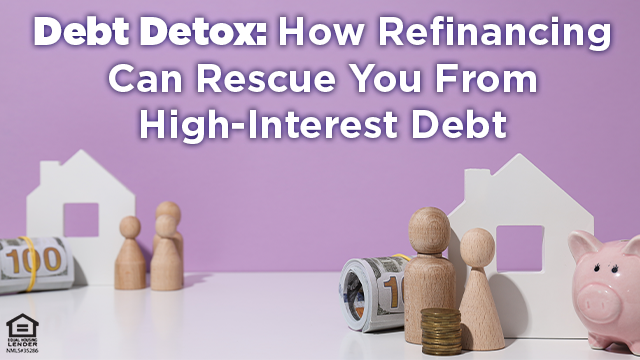
Debt Detox: How Refinancing Can Rescue You From High-Interest Debt

America’s total credit card balance reached a staggering $1.079 trillion in the third quarter of 2023, according to the Federal Reserve Bank of New York.
As interest rates soared in 2022-23, many of us are juggling high payments on auto loans, student loans, credit cards, and more.
If you’ve been looking at your bills lately and wondering how to save on your monthly payments, you should consider refinancing to consolidate your high-interest debt.
An Opportunity to Lower Your Total Household Payments
Many Americans are clinging to the historically low mortgage rates that came with the pandemic, but it’s important to focus on the bigger picture.
Although you may be compromising on your low mortgage rate, refinancing can allow you to significantly lower your total household payments.
The weighted average, or the interest rate that is adjusted to reflect the contribution of each loan to your total debt, is often reduced when consolidating high-interest debt with your mortgage.
Consider a Refinance to Pay Off High-Interest Debt
One of the main benefits of debt consolidation with a refinance is that you’ll likely pay less in overall interest, as mortgage rates are typically much lower than rates associated with credit cards, student loans, car loans, etc.
A cash out refinance allows you to consolidate your high-interest debt and convert it into a lower interest rate.
It’s important to note that debt consolidation mortgages work best when the amount of equity you have in your home allows you to pay for a large percentage- or the entire balance- of high-interest debt.
Using Your Home Equity to Consolidate Debt
As home prices continue to rise, many Americans have more equity in their homes than ever before.
Equity refers to the percentage of your mortgage principal that you’ve paid off, so every time you make a payment on your home loan, you gain a bit of equity in your property.
You take equity out of your home in cash with a cash out refinance. In exchange, you’ll replace your current mortgage with a new mortgage for a higher amount. From there, you make payments just like you did on your last loan.
For example, let’s say you have a $100,000 principal loan balance and $20,000 worth of debt to consolidate. When you opt for a cash out refinance, you take on a loan worth $120,000 and your lender gives you the difference ($20,000) in cash after closing.
Closing Thoughts
Determining if you should refinance your mortgage for debt consolidation purposes will depend on a number of circumstances, but with the right market conditions, you could easily lower your overall monthly payments.
As always, speak with your trusted loan officer to see if a refinance is a good strategy for you today.